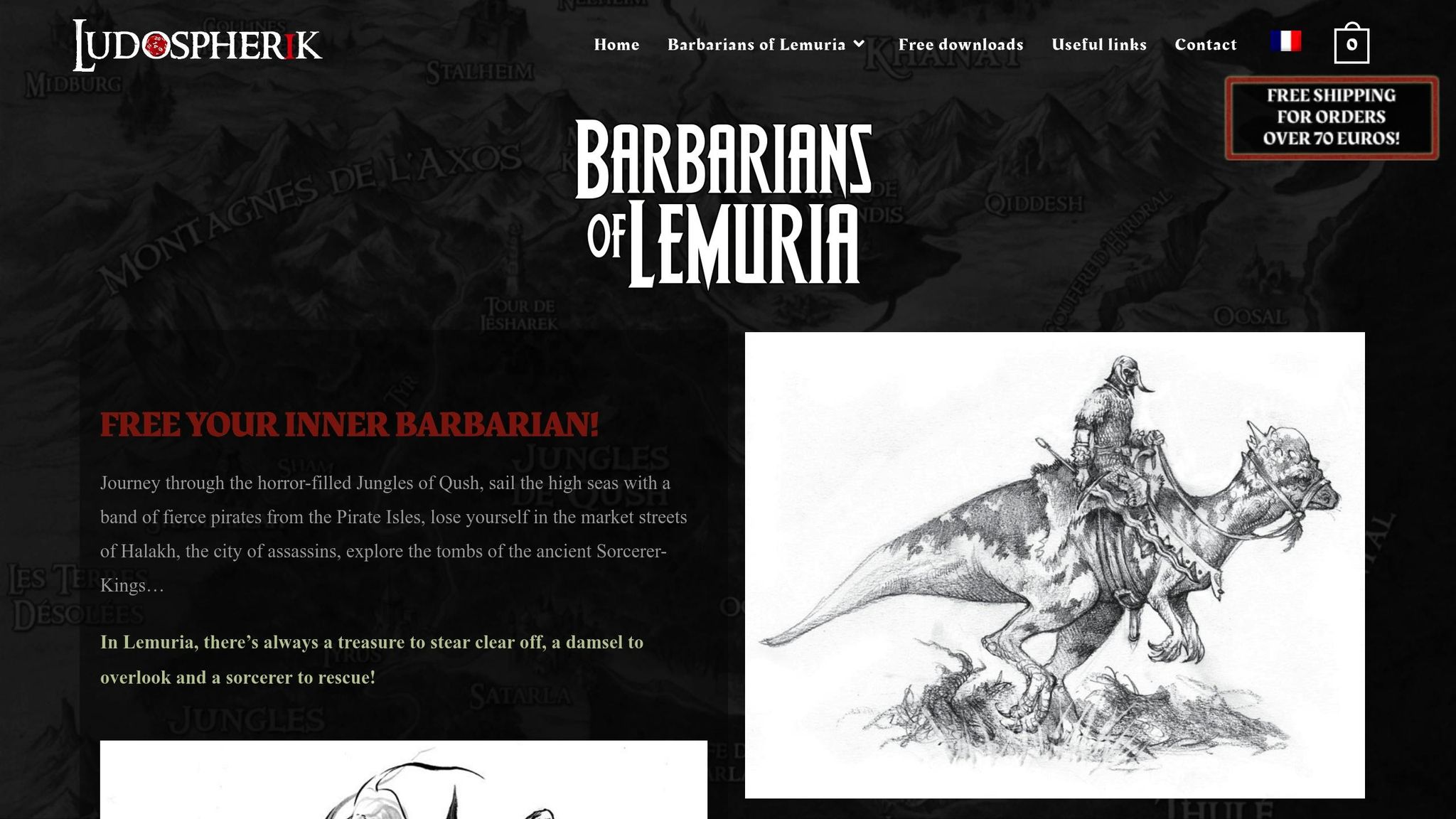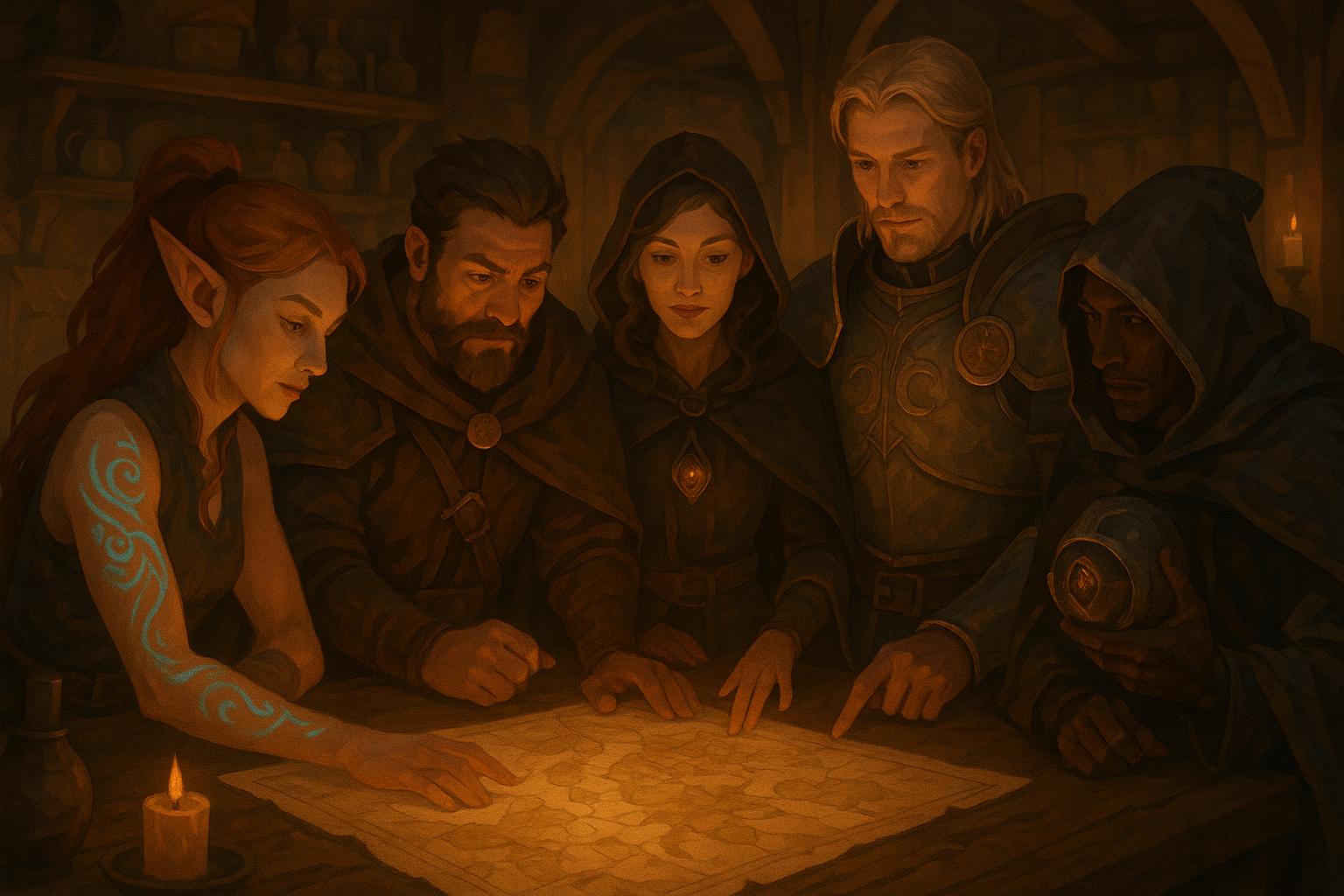When time is short, and you want to jump into a tabletop RPG (TTRPG) session without hours of prep, rules-light games are the solution. These systems are simple, quick to learn, and focus on storytelling and fun rather than complex mechanics. Here’s the gist:
- Learn the rules in under 15 minutes.
- Create characters in about 5 minutes.
- Start playing in 30 minutes or less.
Whether you're a newcomer or a seasoned player, these games are perfect for fast, engaging adventures. Here are five excellent options:
- Knave: A fantasy RPG with a classless, gear-based progression system.
- Into the Odd: A quirky, exploration-heavy game with simple mechanics.
- Lasers & Feelings: A one-page sci-fi RPG with a fun, dual-action system.
- Risus: A free, flexible system great for humor-filled sessions.
- Barbarians of Lemuria: A sword-and-sorcery game with fast combat.
Quick Comparison Table
| Game | Setup Time | Complexity | Theme |
|---|---|---|---|
| Knave | 10–15 minutes | Low to Moderate | Fantasy dungeon crawling |
| Into the Odd | 5–10 minutes | Very Low | Exploration with oddities |
| Lasers & Feelings | 2–5 minutes | Very Low | Sci-fi adventures |
| Risus | 5–10 minutes | Very Low | Any genre, humor-friendly |
| Barbarians of Lemuria | 10–20 minutes | Low to Moderate | Sword-and-sorcery tales |
These games are easy to pick up, require minimal prep, and keep the focus on fun and storytelling. Perfect for spontaneous game nights or introducing friends to TTRPGs!
Top 5 Rules Lite RPG Systems (D&D alternatives!)
What Makes a Rules-Light TTRPG Easy to Learn
The term "rules-light" gets tossed around a lot in the tabletop RPG (TTRPG) world, but what does it actually mean? At its heart, a rules-light system is all about simplicity and focus. As tabletop gaming expert JimmiWazEre explains:
"A great rules-lite RPG isn't undercooked, it's efficient, elegant, and focused."
These systems strip things down to the essentials. Typically, they rely on a single, straightforward mechanic - roll one die, add a small modifier, and compare the result to a target number. This approach eliminates the need for complicated charts or endless calculations.
Another hallmark of rules-light games is how quickly you can create a character. In just a few minutes, players can build functional characters using simple archetypes or even random generation methods. This makes it easy to jump right into the action without spending hours on setup.
These games also focus on what matters most: the story. By keeping mechanics simple, players can spend less time worrying about rules and more time describing their actions, developing their characters, and diving into the narrative. The streamlined design ensures that the story takes center stage, free from unnecessary distractions.
It’s worth noting that rules-light doesn’t mean incomplete or poorly designed. A good system balances simplicity with fairness, offering a clear framework for gameplay. The Game Master (GM) is trusted to make flexible, consistent rulings, leaving plenty of room for creativity while sticking to the system’s core principles.
Another big advantage? Minimal prep work. GMs don’t need to memorize thick rulebooks or plan out intricate encounters, and players can jump right into problem-solving, exploration, and collaboration. As JimmiWazEre puts it:
"If you get overwhelmed by books the size of a university textbook and you want to start small, rules-lite could be for you."
Ultimately, rules-light systems deliver all the excitement and creativity of TTRPGs without the complexity. Their streamlined design makes them accessible, engaging, and perfect for anyone looking to focus on the fun rather than the mechanics. This philosophy lays the groundwork for the diverse and imaginative games we’ll explore next.
1. Knave

Knave, created by Ben Milton, is a lightweight, rules-minimal RPG system that has influenced games like Cairn.
Setup Time (Minutes)
While the exact setup time for Knave isn’t detailed, similar systems such as Cairn make it possible to explain the rules and create characters in about 20 minutes.
Complexity (Scale: Very Low to Moderate)
Knave is designed with simplicity in mind, making it a great choice for beginners. It uses a straightforward d20 roll-under mechanic and focuses on just three ability scores: Strength, Dexterity, and Willpower. Its classless and inventory-driven system simplifies both character creation and gameplay.
Special Features
One of Knave’s standout elements is its inventory-based progression system. Instead of traditional leveling, characters grow stronger by acquiring better gear. This approach keeps things streamlined and has influenced other fast-to-learn RPG systems.
2. Into the Odd

Into the Odd is all about quick, streamlined gameplay that gets you into the action without delay. Here's a closer look at what makes it tick:
Setup Time (Minutes)
Drawing from a setup style similar to Cairn, this game allows you to dive in almost immediately. You can explain the rules and create characters in just about 20 minutes. That means less prep and more play.
Complexity (Scale: Very Low to Moderate)
The game leans heavily on simplicity. It's described as "really rules light" and "fairly easy to teach and learn". This makes it an excellent choice for newcomers who want to jump in without feeling overwhelmed.
Theme
One player pointed out its resemblance to a D&D-like theme. This familiar setting can be a great gateway for those new to tabletop role-playing games, offering a sense of comfort while exploring something fresh.
Special Features
As Random Goblin puts it:
"Into the Odd and its progeny (Electric Bastionland, Mausritter, Cairn) are really rules light but have a lot of lean flavorful meat for good gameplay, and in my experience the combination leads to games that can cover a lot of ground in shorter period of time. You're not chewing up gameable minutes with dense mechanics, but you're also not left dangling and wasting time wondering what to do."
This balance of simplicity and substance allows for engaging sessions that move quickly while still feeling rich and satisfying.
3. Lasers & Feelings
Lasers & Feelings is a shining example of how a streamlined, one-page rule set can deliver an engaging and memorable gaming experience without the need for hefty rulebooks or complicated mechanics.
Setup Time (Minutes)
You can dive into the game in just 10 minutes. It’s perfect for spontaneous game nights or as a quick warm-up for longer sessions.
Complexity
The rules couldn’t be simpler. The entire game revolves around a single six-sided die (d6), with characters defined by just one number and two descriptive traits. This ultra-simplified system makes it easy for anyone to jump in, even if they’re new to tabletop role-playing games.
Theme
The sci-fi setting of Lasers & Feelings complements its straightforward mechanics. The game thrives on the creative contrast between two action categories: "Lasers", representing logic and science-based problem-solving, and "Feelings", which lean on empathy and artistic intuition. This thematic split encourages imaginative storytelling without bogging players down in dense backstory or lore.
Special Features
Oleg Volkov highlights the game’s simplicity and versatility:
"Lasers and Feelings (and its clone Tactical Waifu) fits on one page, and includes a thematic plot generator, a dice roll and describes your character with one number and two words."
The built-in plot generator is a standout feature, allowing you to create adventures on the spot with zero prep time. Whether tackling a high-tech problem or navigating an emotional dilemma, gameplay stays fast and fluid - one roll of the die is all it takes to decide the outcome.
sbb-itb-b8b00a5
4. Risus

Risus is all about quick starts and effortless fun, making it a go-to choice for those who want to dive into a game without wading through complicated rules. Known as an "uber-light" tabletop RPG, it’s designed to focus on creativity and enjoyment rather than dense mechanics. Best of all? It’s completely free, proving you don’t need a stack of rulebooks to have a great time.
Setup Time
With a concise 6-page rule set, Risus gets you up and running in no time. Character creation is equally quick, meaning you can jump straight into the action within minutes.
Complexity
Simplicity is at the heart of Risus. Its straightforward dice mechanics make it easy for anyone to pick up and play. As one player put it:
"For truly super light, we're probably getting into RISUS territory." - TheophilusCarter
There’s no overwhelming skill list or cluttered character sheets to slow you down. This simplicity means you won’t need to constantly flip through the rulebook, making it ideal for casual gaming sessions. The streamlined mechanics also allow for more focus on storytelling and improvisation.
Theme
One of Risus’s strengths is its adaptability. Whether you’re in the mood for medieval fantasy, a modern-day mystery, or even something completely out-of-the-box, Risus can handle it all with ease.
Special Features
Risus shines in its ability to support laid-back, social gameplay. It’s perfect for "beer-and-pretzels" sessions, where the emphasis is on having fun rather than following intricate rules. The system also encourages on-the-fly creativity, giving game masters plenty of room to improvise. Interestingly, Risus draws inspiration from the Ghostbusters RPG system, a game so intuitive it could be explained in just five minutes. This legacy of simplicity and accessibility is a big part of why Risus remains a favorite for quick and flexible gaming.
5. Barbarians of Lemuria

Barbarians of Lemuria delivers a classic sword and sorcery experience with a focus on fast-paced action and simple mechanics. It captures the essence of pulp fantasy, offering epic adventures without bogging players down with overly complicated rules.
Setup Time
Thanks to its streamlined design, you can create characters and jump into the action almost immediately. It’s perfect for groups eager to dive straight into the story.
Complexity
This game is easy to learn and play, making it a fantastic option for newcomers. At the same time, it offers just enough depth to keep experienced players engaged. Its mechanics prioritize storytelling over constant rule-checking, creating a smooth, immersive gaming experience.
Theme
If you’re a fan of the sword and sorcery genre, Barbarians of Lemuria won’t disappoint. Imagine the world of Conan the Barbarian fused with the spirit of classic pulp adventures. The game’s setting is packed with daring heroes, ancient magic, and mysterious lands, creating the perfect backdrop for thrilling tales of danger and discovery.
Special Features
One of the standout features of Barbarians of Lemuria is its quick and efficient combat system. As Classic Al puts it:
"Barbarians of Lemuria works fairly well for short sessions. It's rules-lite and a dangerous combat scene can be played through in 15 minutes (or less!), so you can get a lot done in those 2 hours."
This rapid combat resolution keeps the game moving, allowing players to stay focused on the story. The minimalist rules ensure that gameplay remains dynamic and engaging, avoiding long pauses for tactical debates and keeping the excitement alive.
Quick Comparison: Rules-Light TTRPGs at a Glance
Here's a quick look at the setup times for five popular rules-light tabletop RPGs (TTRPGs). Whether you’re short on time or just want to dive straight into the action, this table gives you a clear idea of how quickly you can get started.
| Game | Setup Time |
|---|---|
| Knave | 10–15 minutes |
| Into the Odd | 5–10 minutes |
| Lasers & Feelings | 2–5 minutes |
| Risus | 5–10 minutes |
| Barbarians of Lemuria | 10–20 minutes |
Choose the one that fits your schedule and get ready to play!
How to Choose the Right Rules-Light TTRPG
Picking the perfect rules-light tabletop RPG (TTRPG) for your group depends on a few key factors: group size, genre preferences, play style, time availability, and player experience. Each of these plays a role in finding a game that fits your table like a glove.
Group size is a big consideration. Some games shine in smaller, more intimate groups, while others, like Risus, are built to handle larger gatherings with ease.
Next, think about your group's favorite genre and complexity level. If your table loves classic fantasy adventures, Knave delivers that old-school vibe with a modern, simplified approach. For sci-fi enthusiasts, Lasers & Feelings offers a lighthearted journey through the stars. And if gritty, sword-and-sorcery action feels more your speed, Barbarians of Lemuria captures the raw, Conan-style intensity.
Play style preferences also matter. Some groups thrive on deep roleplay, while others prefer action-packed sessions. For example, Into the Odd focuses on exploration and quirky, inventive challenges, keeping mechanics simple so players can dive into the story. On the flip side, Risus leans into humor and over-the-top scenarios, making it a great pick for groups who want to keep things light and entertaining.
Don’t forget to factor in your available time. Rules-light systems are known for their quick setup, but some are faster than others. Games like Risus can have you rolling dice within minutes, while others, like Knave, might take a bit longer for character creation but still stay within the realm of short prep times.
Player experience is another important element. For newcomers, simple systems like Risus, which only uses standard six-sided dice, are easy to learn and jump into. More experienced players, however, might enjoy something like Knave, which integrates seamlessly with classic adventure modules and offers more depth.
If you’re unsure where to start, resources like the TTRPG Games Directory can be incredibly helpful. It breaks down each game's mechanics and themes, helping you find a system that matches your group's vibe and gaming goals.
One of the best things about rules-light TTRPGs is their flexibility. Their quick setup and easy mechanics make it simple to try out different systems as your group's tastes evolve. Whether you're experimenting or settling into a favorite, these games are perfect for keeping your sessions fresh and fun.
Conclusion
Rules-light TTRPGs offer a perfect mix of simplicity and enjoyment, making them an excellent choice for newcomers and seasoned players alike. By skipping the complicated mechanics of traditional systems, these games allow you to dive straight into storytelling and adventure without hours spent poring over rulebooks.
Whether you're into fantasy dungeon crawls like Knave, quirky sci-fi escapades with Lasers & Feelings, or action-packed hilarity in Risus, there's something for everyone. Best of all, many of these games require just a few dice and a good dose of imagination to get started.
With the ability to jump into a session in under 30 minutes, these systems are ideal for busy schedules, spur-of-the-moment gaming, or introducing friends to the hobby. They strip away the barriers of complexity while keeping the heart of role-playing alive: creativity and shared storytelling.
So, pick a game, gather your group, and start your adventure. The only risk? You might enjoy it so much that you'll be planning your next session before this one even ends. Sometimes, the simplest games lead to the most unforgettable stories.
FAQs
Why choose a rules-light TTRPG instead of a more complex system?
Rules-light TTRPGs are a fantastic choice for those looking for quick and straightforward gameplay. With minimal prep work required, you can dive into the action without getting bogged down by complex mechanics. This makes them especially appealing for beginners or groups who don’t have hours to spare learning intricate rules.
What’s more, these systems shift the focus toward creativity and storytelling. By prioritizing the narrative over rigid rules, players can fully immerse themselves in the story rather than constantly flipping through rulebooks. The result? A smoother, more engaging experience that keeps everyone at the table invested.
How do rules-light TTRPGs maintain balance with simplified mechanics?
Rules-light TTRPGs achieve balance by keeping their mechanics simple and easy to grasp. Rather than diving into intricate systems, these games put the spotlight on storytelling, player imagination, and teamwork. This simplicity helps the game move along smoothly without being slowed down by overly detailed rules.
The Game Master (GM) or facilitator plays a key role in maintaining balance. They ensure fair play and tweak the narrative as needed to keep things fun and engaging for everyone involved. By focusing on flexibility and player-driven decisions, these games create an enjoyable experience without leaning heavily on complex numbers or mechanics.
Are rules-light TTRPGs suitable for groups of different sizes and experience levels?
Rules-light tabletop role-playing games (TTRPGs) are a great choice for groups of all sizes and skill levels. Their straightforward mechanics make them approachable for newcomers, while still providing enough substance to keep experienced players invested.
One of their biggest strengths is adaptability. Whether you’re playing with just two people or a larger group, these games can easily adjust to fit your needs. The simplicity of the rules ensures that everyone can dive in and have fun, no matter how much - or how little - experience they have with TTRPGs.


